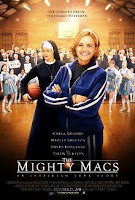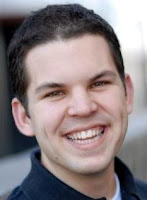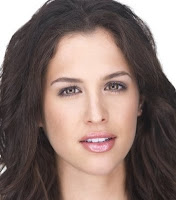This coming weekend marks the premier of “The Mighty Macs“, an exciting new movie about basketball and the power of faith. The film is based on the incredible true story of the 1971-72 Immaculata Mighty Macs team that became the original Cinderella-story in women’s college basketball.
 Immaculata was a private Catholic women’s college run by nuns, short on money and shrinking fast. In 1971, when new head coach Cathy Rush arrived, there was no gym (it burned down) and no basketball team.
Immaculata was a private Catholic women’s college run by nuns, short on money and shrinking fast. In 1971, when new head coach Cathy Rush arrived, there was no gym (it burned down) and no basketball team.
But Rush quickly turned things around. Her arrival was a turning point for the school in many ways. In Rush, the young players saw a driven woman who was working outside the house at a time when that was rare. Rush’s own faith and dedication were contagious and spread throughout the school–even to the downcast nuns.
Under Rush’s leadership the Mighty Macs practiced relentlessly, yet barely qualified for the first ever national tournament in 1972. But incredibly they went on to win three straight national titles, garnering Cathy Rush an induction into the Naismith Memorial Basketball Hall of Fame in 2008.
I recently had the chance to talk with Theresa Grentz, a star player on the original Immaculata team, and Katie Hayek, the talented actress who played Theresa in the Mighty Macs film.
Brandon: Theresa, you’ve been a tremendously successful player and coach. You’ve won championships at just about every level; you were the first full-time women’s basketball coach in NCAA history, the Big Ten Coach of the Year, the 1992 US Olympic team coach, and in 2001 you were inducted into the Women’s Basketball Hall of Fame. With all of that incredible success, what would you say is your greatest achievement? What are you most proud of?
 Theresa: Without question, my two sons. All those other things are great. I’m proud of all of my athletic accomplishments. But nothing beats my children. I value them way more than all those other things.
Theresa: Without question, my two sons. All those other things are great. I’m proud of all of my athletic accomplishments. But nothing beats my children. I value them way more than all those other things.
 Brandon: After all of those incredible experiences, though, you came back to Immaculata, where you now serve as the Vice President for University Advancement. Why did you come back to the school? Why is Immaculata so special?
Brandon: After all of those incredible experiences, though, you came back to Immaculata, where you now serve as the Vice President for University Advancement. Why did you come back to the school? Why is Immaculata so special?
Theresa: Many assistant coaches throughout my career told me that I have an angel on my shoulder. I really took that to heart in my own coaching and here’s a picture that sums it up.
When I was coaching, I always kept three books on my desk—the playbook, Emily Post’s Etiquette, and a King James Version of the Bible. I wanted to teach young girls how to be good basketball players, how to be good women, and how to live their faith on and off the court.
 Brandon: What are some differences you experienced between coaching at a Catholic school and a secular school?
Brandon: What are some differences you experienced between coaching at a Catholic school and a secular school?
Theresa: Well, the main difference is money—Catholic schools have none of it! At secular schools we had numerous trainers, nice facilities, plenty of equipment, and we traveled nicely and were give per diems. That’s completely the opposite of my Catholic schools. At Immaculata, for instance, we all travelled in just two cars—one smoking and one non-smoking (I won’t tell you which one I was in!).
 Brandon: That’s a great segue to my question for you, Katie. In high school, you played basketball for a Catholic school, but you’ve also played for secular schools including the University of Miami. What did you find most different between the two?
Brandon: That’s a great segue to my question for you, Katie. In high school, you played basketball for a Catholic school, but you’ve also played for secular schools including the University of Miami. What did you find most different between the two?
Katie: The Catholic teams I played on always felt more like a family. You bonded with your team because you had to slug through the difficulties together. And with the lack of money, the grueling travel and long practices, and especially the religious connections, we all developed really tight bonds.
Brandon: You earned a full-ride scholarship to play basketball for the University of Miami, so you already had some basketball background before The Mighty Macs. Did many of the other actresses come in with basketball experience?
Katie: Tim Chambers, the film’s producer and director, told all the girls at the audition that nobody was allowed to read a part until they first showed what they could do on the basketball court. So they began the audition with actual basketball drills, which was kind of unnerving. You only had the chance to show a couple of quick moves and while I did alright, I finished thinking, “That’s it?! Let me show me you more!” In the end, though, all of the actresses on the team had played basketball at some level in the past. Most of them played in high school and many had played in college, so there was a lot of talent among the cast.
Brandon: In the film, your whole team plays basketball in the only uniforms available—long, flowing tunics. What was it like playing basketball in these outfits?
Katie: The tunics were surprisingly comfortable! In fact once we put it on and started playing in it, I didn’t even notice. It’s loose and flowing and we don’t have to worry about pulling up our shorts or messing with spandex. What really gave us problems, though, were the Chuck Taylors. The shoes kept giving us blisters and were more of an issue than the tunics.
Brandon: Overall, what was the best part of filming this movie?
Katie: Well, for one thing, it brought together my two great passions—basketball and acting. Playing basketball on set all day long was a real joy. But another thing that stays with me is the whole story. I loved getting to meet Theresa Grentz [her real-life counterpart], coach Cathy Rush, and all the players from the real Immaculata team. Learning all the things they went through, seeing how they bonded as a team and overcame such diversity, that really inspired me and sticks with me even to this day.

